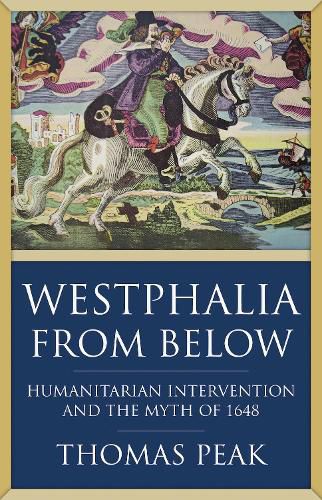Readings Newsletter
Become a Readings Member to make your shopping experience even easier.
Sign in or sign up for free!
You’re not far away from qualifying for FREE standard shipping within Australia
You’ve qualified for FREE standard shipping within Australia
The cart is loading…






An original contribution to international ethics and humanitarian intervention, Westphalia From Below draws on history and IR theory to offer a fresh analysis of an insufficiently understood subject. This new history of the lead-up to 1648 exposes the mythical and problematic nature of the Peace of Westphalia and its implications for international politics, questioning the impoverished visions of this landmark treaty that influence IR theory and humanitarian protection to this day.
IR is infused with perspectives from the humanities based on reconstructions of the mentalities of the Thirty Years’ War. Scholars tell us that the Westphalia settlement instituted an absolutist understanding of sovereignty as a right and a strict principle of non-intervention, which was only later displaced by the ‘radical innovation’ of humanitarian intervention-but Thomas Peak exposes this myth as a fabrication that cannot sustainably be upheld as a normative precept. He shows from the ground up that, in fact, Westphalia established an order grounded in human dignity, in which sovereignty and intervention were not opposed. This true legacy of Westphalia has important and valuable connections with recent conceptions of international politics, particularly the legitimacy of intervention on humanitarian grounds. Peak’s study is as relevant as it is refreshing.
$9.00 standard shipping within Australia
FREE standard shipping within Australia for orders over $100.00
Express & International shipping calculated at checkout
An original contribution to international ethics and humanitarian intervention, Westphalia From Below draws on history and IR theory to offer a fresh analysis of an insufficiently understood subject. This new history of the lead-up to 1648 exposes the mythical and problematic nature of the Peace of Westphalia and its implications for international politics, questioning the impoverished visions of this landmark treaty that influence IR theory and humanitarian protection to this day.
IR is infused with perspectives from the humanities based on reconstructions of the mentalities of the Thirty Years’ War. Scholars tell us that the Westphalia settlement instituted an absolutist understanding of sovereignty as a right and a strict principle of non-intervention, which was only later displaced by the ‘radical innovation’ of humanitarian intervention-but Thomas Peak exposes this myth as a fabrication that cannot sustainably be upheld as a normative precept. He shows from the ground up that, in fact, Westphalia established an order grounded in human dignity, in which sovereignty and intervention were not opposed. This true legacy of Westphalia has important and valuable connections with recent conceptions of international politics, particularly the legitimacy of intervention on humanitarian grounds. Peak’s study is as relevant as it is refreshing.